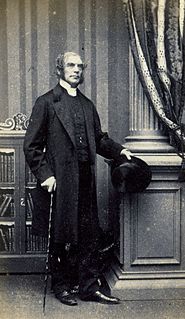A Quote by Wayne Dyer
Most people think that God wants us to demonstrate our love for God by having churches and by having symbols - and I think that's a huge error.
Related Quotes
I preach that anybody can improve their lives. I think God wants us to be prosperous. I think he wants us to be happy. To me, you need to have money to pay your bills. I think God wants us to send our kids to college. I think he wants us to be a blessing to other people. But I don't think I'd say God wants us to be rich. It's all relative, isn't it?
I don’t think God has a gender. I don’t think God hates gays or Democrats, and I don’t think you have to be Born Again to find your way to Heaven. I believe God expects us to care for one another, even those who are different. God wants us to be good stewards of this planet, and that means not wasting or violating its resources. Most of all, it means not blowing it up. Especially not in God’s name.
There are two gods. The god our teachers teach us about, and the God who teaches us. The god about whom people usually talk, and the God who talks to us. The god we learn to fear, and the God who speaks to us of mercy. The god who is somewhere up on high, and the God who is here in our daily lives. The god who demands punishment, and the God who forgives us our trespasses. The god who threatens us with the torments of Hell, and the God who shows us the true path.
There are two gods. A god who casts us off because of our sins, and a God who calls to us with His love.
God's love has a width, length, height, and depth, but we will never reach the end of it. Our capacity to experience God's love will be exhausted long before God's capacity to give it is strained. The picture of having Christ dwell inside us by faith presents us with compelling and comforting possibilities. What Christ does in us and through us will always be 'exceedingly abundantly above all we ask or think.'
It is an item of faith that we are children of God; there is plenty of experience in us against it. The faith that surmounts this evidence and is able to warm itself at the fire of God's love, instead of having to steal love and self-acceptance from other sources, is actually the root of holiness: It is a fatal mistake to think of holiness as a possession which we have distinct from our faith... Faith is the very highest form of our dependence on God.
God notices you. The fact is he can't take his eyes off of you. However badly you think of yourself, God is crazy about you. God is in love with you. Some of us even fear that someday we'll do something so bad that he won't notice us anymore. Well, let me tell you, God loves you completely. And he knew us at our worst before he ever began to love us at all. And in the love of God there are no degrees, there is only love.
Churches typically argue is that God wants God's people to have a good life, and that a good life involves prosperity. This prosperity is not just emotional well-being, spiritual well-being, or physical well-being - it's also having good stuff. Having a nice house, a nice car, good clothing, etc. It's a package deal.
Interestingly, God's remedy for Elijah's depression was not a refresher course in theology but food and sleep... Before God spoke to him at all, Elijah was fed twice and given a good chance to sleep. Only then, and very gently, did God confront him with his error. This is always God's way. Having made us as human beings, He respects our humanness and treats us with integrity. That is, He treats us true to the truth of who we are. It is human beings and not God who have made spirituality impractical.
The kind of love that God has for us, I think, is of an infinite longing for union, and the kind of love that God wants us to have for him, I think, is of this also endless longing. Now in eros we lose ourselves. I think erotic love transforms us, but it does so only momentarily. It has to be embedded in something much longer, a much bigger narrative called marriage or durable relationship or something like that.
There is a lot of difference between tempting and leading into error. God tempts but does not lead into error. To tempt is to provide opportunities for us to do certain things if we do not love God, but putting us under no necessity to do so. To lead into error is to compel a man necessarily to conclude and follow a falsehood.
Man depends on God for all things: God depends on man for one. Without man's love God does not exist as God, only as creator, and love is the one thing no one, not even God himself, can command. It is a free gift or it is nothing. And it is most itself, most free, when it is offered in spite of suffering, of injustice, and of death . . . The justification of the injustice of the universe is not our blind acceptance of God's inexplicable will, nor our trust in God's love, his dark and incomprehensible love, for us, but our human love, notwithstanding anything, for him.
Behold in faith the sinless, spotless Lamb of God as having already borne that weight, as having suffered for those sins, as having died for those transgressions, and accept the precious truth that it was God's eternal love that laid them all on Jesus, and that nothing is left for you to do but to believe in Jesus, that He saves to the uttermost all that come unto God by Him.
God’s love sets us free from the need to seek approval. Knowing that we are loved by God, accepted by God, approved by God, and that we are new creations in Christ empowers us to reject self-rejection and embrace a healthy self-love. Being secure in God’s love for us, our love for Him, and our love for ourselves, prepares us to fulfill the second greatest commandment: To love our neighbor as ourselves.






































